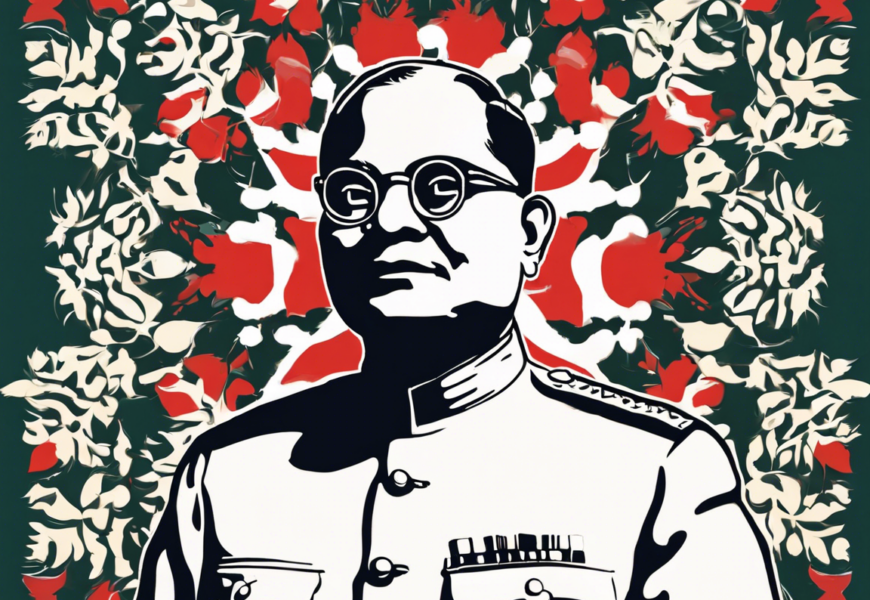On January 23rd every year, India honors one of its most influential and revered leaders, Subhash Chandra Bose, on his birth anniversary. He was born in 1897 in Cuttack, India, and played a pivotal role in the country’s struggle for independence from British colonial rule. Bose is known for his unwavering commitment to freedom, his charismatic leadership, and his innovative strategies in the fight against the British Empire.
Early Life and Education
Subhash Chandra Bose was a bright and ambitious student from a young age. He excelled in academics and was deeply influenced by the teachings of Swami Vivekananda and Rabindranath Tagore. Bose went on to study at the prestigious Presidency College in Calcutta and later at the University of Cambridge in England. His experiences in England exposed him to the harsh realities of British imperialism, which fueled his resolve to fight for India’s independence.
Rise to Leadership
Subhash Chandra Bose entered the political arena with a strong sense of purpose and determination. He joined the Indian National Congress, the leading political party in the fight for independence, and quickly rose through the ranks due to his dynamic leadership style and unwavering commitment to the cause. Bose was elected as the president of the Indian National Congress in 1938 and 1939, but differences in ideology with Mahatma Gandhi led him to resign from the party.
Formation of the Forward Bloc
Undeterred by his differences with the Congress party, Bose formed the Forward Bloc in 1939, a radical political group dedicated to achieving independence through any means necessary. The Forward Bloc advocated for complete freedom for India and was willing to cooperate with any country or organization that could help in the fight against British imperialism. Bose’s leadership of the Forward Bloc solidified his reputation as a fearless and dedicated freedom fighter.
The INA and Legacy
One of the most significant contributions of Subhash Chandra Bose to India’s independence movement was the formation of the Indian National Army (INA) in 1942. The INA, also known as Azad Hind Fauj, was formed with the primary objective of liberating India from British rule. Bose’s famous rallying cry, “Give me blood, and I shall give you freedom!” inspired thousands of Indian soldiers to join the INA and fight alongside the Japanese forces against the British.
Bose’s military campaign in Southeast Asia during World War II brought him to the forefront of the Indian independence struggle. Although the INA’s efforts were not entirely successful in driving out the British, their bravery and sacrifice had a profound impact on the morale of the Indian population. Bose’s legacy as a revolutionary leader who was willing to sacrifice everything for his country continues to inspire generations of Indians.
Controversies and Mysteries
Subhash Chandra Bose‘s life was not without controversy and mystery. His relationship with Nazi Germany and Imperial Japan raised questions about his alliances and tactics in the fight for independence. Bose’s mysterious disappearance in 1945, following a plane crash in Taiwan, has fueled numerous conspiracy theories and debates about his fate. Despite multiple inquiries and investigations, the circumstances surrounding Bose’s death remain shrouded in mystery, adding to the enigmatic aura that surrounds his legacy.
Celebrating Bose Jayanti
On Subhash Chandra Bose Jayanti, Indians across the country pay tribute to this legendary leader through various events and ceremonies. Schools, colleges, and government institutions organize special programs to commemorate Bose’s contributions to the freedom struggle. Political leaders and public figures deliver speeches highlighting Bose’s vision and principles, emphasizing the importance of perseverance and courage in the face of adversity.
Remembering a Revolutionary Icon
Subhash Chandra Bose‘s legacy as a revolutionary icon continues to inspire millions of people around the world. His fearless pursuit of freedom, his unwavering determination, and his innovative strategies in the fight against imperialism have earned him a permanent place in India’s history. As we celebrate Bose Jayanti each year, we recommit ourselves to upholding his values of freedom, equality, and justice, ensuring that his vision of a truly independent and prosperous India remains alive in our hearts and minds.
Frequently Asked Questions (FAQs)
1. Who was Subhash Chandra Bose?
– Subhash Chandra Bose was a prominent Indian nationalist leader who played a key role in the country’s struggle for independence from British colonial rule.
2. What is Subhash Chandra Bose known for?
– Bose is known for his dynamic leadership, formation of the Indian National Army (INA), and his unwavering commitment to freedom and independence.
3. Why is Subhash Chandra Bose Jayanti celebrated?
– Subhash Chandra Bose Jayanti is celebrated to commemorate the birth anniversary of this revolutionary leader and to honor his contributions to India’s freedom movement.
4. What is the significance of the Indian National Army (INA) in Bose’s legacy?
– The INA, formed by Bose during World War II, symbolizes the spirit of sacrifice and patriotism of Indian soldiers in the fight against British imperialism.
5. What are some of the controversies surrounding Subhash Chandra Bose?
– Bose’s alliances with Nazi Germany and Imperial Japan, as well as the mystery surrounding his death, have been subjects of controversy and speculation over the years.
6. How is Subhash Chandra Bose remembered in India today?
– Bose is remembered through various ceremonies, programs, and tributes on his birth anniversary, with an emphasis on his values of freedom, equality, and courage.
7. What was the Forward Bloc, and why did Bose form it?
– The Forward Bloc was a radical political group formed by Bose to pursue complete freedom for India through any necessary means, after resigning from the Indian National Congress.
8. How did Subhash Chandra Bose’s upbringing influence his leadership style?
– Bose’s exposure to the teachings of Swami Vivekananda and Rabindranath Tagore instilled in him a sense of nationalism, resilience, and dedication to the cause of freedom.
9. What impact did Subhash Chandra Bose have on India’s independence movement?
– Bose’s leadership, vision, and military strategies inspired a sense of unity and resilience among Indians, contributing significantly to the eventual achievement of independence.
10. What can we learn from Subhash Chandra Bose’s life and legacy?
– Bose’s life teaches us the importance of courage, determination, and sacrifice in the pursuit of noble ideals such as freedom, justice, and equality.



